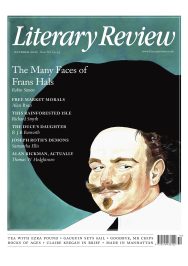Paul Genders
Return to Westworld
Liberation Day
By George Saunders
Bloomsbury 224pp £18.99
George Saunders seems such a good-humoured and unegotistical writer that I wonder if he’s embarrassed by the sheer scale of the adulation he receives. His latest collection of stories, his first work of fiction since Lincoln in the Bardo, winner of the 2017 Booker Prize. That victory came on the back of years of lavish praise from his peers. ‘There is no one better, no one more essential,’ says Dave Eggers; Zadie Smith and Jonathan Franzen, among others, have echoed the sentiment.
It isn’t entirely his own fault, then, if we approach Liberation Day hoping for more than just another suite of expertly crafted short stories of the kind we’re used to from Saunders and authors like him, who teach creative writing at prestigious American universities and publish regularly in the New Yorker. After emerging in the late 1990s alongside other late postmodernists such as David Foster Wallace, who similarly mixed madcap invention with a degree of moral seriousness, Saunders has gone on to become not just an acknowledged technical master but almost a generation’s literary conscience too. The word ‘genius’ often occurs in the lengthy press cuttings sections that, these days, preface his books.
If literary genius in 2022 is exemplified by the title story that opens this collection, though, it may be time to rethink how much store we set by the label. In this novella-length fantasy, desperate job seekers submit to having their identities erased so that they can perform

Sign Up to our newsletter
Receive free articles, highlights from the archive, news, details of prizes, and much more.@Lit_Review
Follow Literary Review on Twitter
Twitter Feed
Literary Review is seeking an editorial intern.
Though Jean-Michel Basquiat was a sensation in his lifetime, it was thirty years after his death that one of his pieces fetched a record price of $110.5 million.
Stephen Smith explores the artist's starry afterlife.
Stephen Smith - Paint Fast, Die Young
Stephen Smith: Paint Fast, Die Young - Jean-Michel Basquiat: The Making of an Icon by Doug Woodham
literaryreview.co.uk
15th-century news transmission was a slow business, reliant on horses and ships. As the centuries passed, though, mass newspapers and faster transport sped things up.
John Adamson examines how this evolution changed Europe.
John Adamson - Hold the Front Page
John Adamson: Hold the Front Page - The Great Exchange: Making the News in Early Modern Europe by Joad Raymond Wren
literaryreview.co.uk